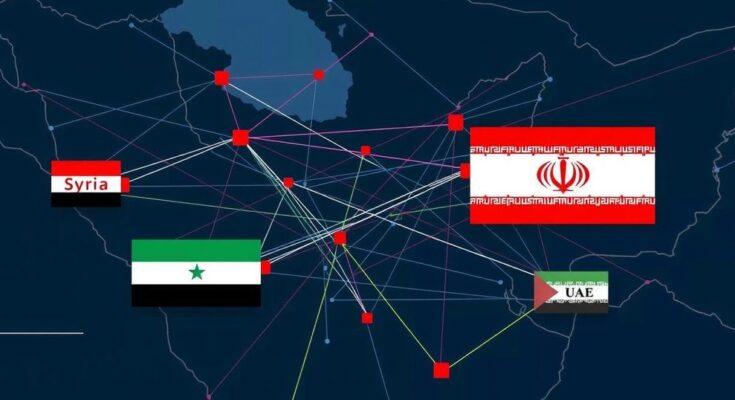The Syrian regime, facing opposition gains in northern Syria, is reaching out for support from Iraq, Iran, and the UAE. After losing Aleppo, regime leader Bashar al-Assad has engaged with these nations to fortify alliances and combat terrorism. The regime’s relationships with Gulf states hint at a shift in regional perceptions towards stability and sovereignty, amidst ongoing challenges.
In a strategic bid to strengthen regional backing amidst escalating threats from opposition forces in northern Syria, the Syrian regime is proactively engaging with Iraq, Iran, and the United Arab Emirates (UAE). Following the recent loss of Aleppo to armed groups, the regime’s control is primarily confined to western Syria, while eastern territories remain under U.S.-backed Syrian Democratic Forces (SDF), and northern regions are largely dominated by Turkey. Furthermore, the Idlib province is governed by Hayat Tahrir al-Sham, a key opposition faction leading offensive actions against the regime.
Venues of support include dialogues between Syrian President Bashar al-Assad and leaders from allied nations. Notably, Assad maintained contact with the Iraqi Prime Minister, Mohammed Shia’ Al Sudani, to discuss not only immediate developments but also the enduring partnership between Damascus and Baghdad. During their conversation, considerable emphasis was placed on cooperation against terrorism, indicating Iraq’s commitment to support Syria’s sovereignty and integrity in times of conflict.
Moreover, in a recent communication with Sheikh Mohammed bin Zayed Al Nahyan of the UAE, President Assad reiterated Syria’s resolve to uphold its territory against insurgent threats, expressing confidence in its capabilities to counter terrorist acts with assistive alliances. This call saw Sheikh Mohammed affirming the UAE’s backing for Syrian sovereignty and its endeavors against extremist forces, while also advocating for a peaceful resolution that aligns with the aspirations of the Syrian populace.
Such overtures from the Syrian regime exemplify its intent to rebuild connections with Gulf states following years of isolation since the onset of the civil war. Post-Egypt’s initiative to reintegrate Assad into regional frameworks, there has been a visible shift, with several nations reconsidering their initial stance fearing that unmitigated disorder in Syria poses a greater threat than Assad’s rule. Despite the regime’s recent setbacks, it continues to seek alliances that provide substantial support from Iraq, Iran, and other allied nations, underscoring the delicate dynamics of the ongoing conflict in the region.
The ongoing Syrian conflict, which erupted in 2011, has seen the fragmentation of territorial control among various forces, leading to a complex and precarious situation. The Syrian government, led by President Bashar al-Assad, has regained significant territory but continues to face armed resistance, particularly in the north. With crucial regions like Aleppo lost, Assad’s administration is compelled to seek assistance from neighboring allied countries to counteract opposition group advances and solidify its governance amid increasing vulnerability.
The Syrian regime’s attempts to cultivate support from Iraq, Iran, and the UAE signify its awareness of vulnerabilities following territorial losses. While Assad celebrates the emerging camaraderie with Gulf nations, the recent offensives by opposition groups reveal the ongoing instability within Syria. The need for robust alliances underscores the complex geopolitics of the region, where the balance between state sovereignty and the threat of terrorism remains a central concern.
Original Source: www.jpost.com




